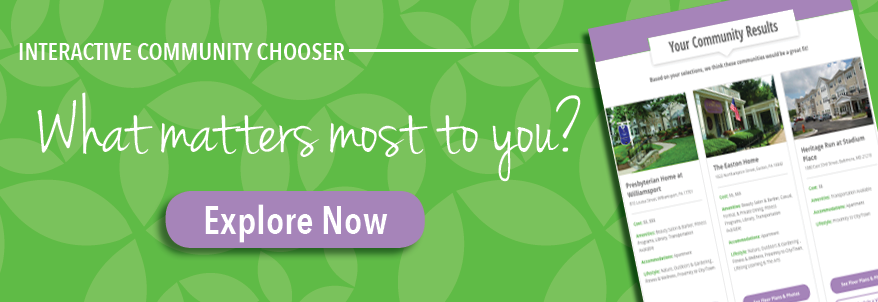
What to Look for in Senior Living Communities in PA
Updated from the original publication on January 30, 2019.
Are you considering different senior living options for yourself or a loved one? With so many communities to choose from throughout Pennsylvania, it can be difficult to determine which one is the best fit. To make sure you’re selecting the best senior living community in PA, look for one that has the following features.
1. Up-to-Date Certifications
First and foremost, you want to be sure that you or your senior loved one is moving to a reputable senior living community. Asking about the certifications a community holds should be one of the very first inquiries you make. There are a few important certifications you should look for, including:
-
LeadingAge Quality First Certification - Formerly the American Association of Homes and Services for the Aging, LeadingAge verifies that member communities are dedicated to quality and innovative care.
-
CARF-CCAC Accreditation - The merger of the Commission on Accreditation of Rehabilitation Facilities (CARF) and Continuing Care Accreditation Commission (CCAC) created a more comprehensive accreditation process. This accreditation acts as an independent resource for seniors and families to ensure that the community they are choosing is up to industry standards.
-
CMS Rating - The Centers for Medicaid and Medicare Services (CMS) gives communities a one-to-five star rating based on the quality of care the community provides residents. When you’re assessing senior living communities in PA, look for options with high CMS ratings.
2. The Right Care Options
Every senior has a different level of care needs. This should be a crucial consideration when you’re looking at senior living communities in PA. Communities provide a different level of care based on the residents’ needs. Here are some different care options to consider:
-
Independent Living - Independent living communities offer maintenance-free senior living for those who need no assistance.
-
Assisted Living - Assisted living communities still offer the independence some seniors are looking for, while having staff members on hand to help with the day-to-day aspects of life.
-
Skilled Nursing and Rehab - Some seniors need 24-hour care due to an illness or because they are recovering from surgery. The facilities also offer rehabilitation for seniors post-injury, illness, or surgery, as well.
-
Memory Support - Memory support communities are designed specifically for seniors with memory challenges, like Alzheimer’s disease or dementia. This option offers a safe, secure place for seniors to get the specific care they need.
-
Adult Day Services - Many seniors live at home with their families, but need a safe, comfortable place to go during the day while family members are at work. Adult day services include meals and activities.
-
Respite Care - Similar to adult day services, sometimes a caretaker is out of town and unable to care for a senior loved one. Respite stays are short-term options for seniors who need assistance and care when a caretaker is unavailable.
-
At-Home Care - Some seniors stay in their own homes, but still need care. If family members work, live far away, or are unavailable, at-home care providers can check in on seniors and provide specific care.
-
End of Life Care - Seniors at the end of their lives need both physical and spiritual care, as do their families. End of life care providers are there to support families and make seniors as comfortable as possible.
Assess your own or your senior loved one’s care needs, and compare them to the options listed above. Once you have a better idea of the type of care your loved one needs, the community selection process is much easier.
3. An Engaging Community
Your loved one’s stay at a senior living community in PA should be both comfortable and lively. These communities offer activities to keep seniors entertained, busy, and engaged. Some seniors are afflicted with loneliness, especially after a spouse passes away. A need to engage in a new community is a common reason why seniors move into senior living communities.
In the best communities, seniors can always find something to do, from joining gardening or book clubs to participating in a game night. In fact, some communities even offer physical activities like yoga or aerobics to keep seniors active and healthy. Be sure to ask about the activities the communities you're considering have to offer.
4. The Ideal Location
Location is an important factor when considering senior living communities in PA. You want to be sure that your senior loved one is close to friends and family, but also to their doctors and care providers. This helps maintain continuity of care.
Also, seniors still want to get out of the house and take advantage of the amenities in their surrounding area. Make sure the community you choose is close to restaurants, grocery stores, and shops. Plus, many senior living communities offer transportation to these local attractions, making it easy for residents to take advantage of all their town has to offer.
5. Skilled Staff
Staff members will be with your senior loved one around the clock, so it’s important that they are qualified, trustworthy, and most of all, kind. Before you make your decision about which senior living community is right for your loved one, visit with staff members and get to know them. Also, be sure to talk to community directors about the qualifications of those caring for the residents.
6. Comfortable Housing
In addition to being well cared for, you also want to be sure that your loved one is comfortable in their new environment. A tour of the different communities is essential, but before you take your tour, talk with your future resident and the rest of your family about what you’re looking for in accommodations. Do you want a private apartment? What about an in-unit kitchen for a senior who loves to cook? Once you have an idea of what you’re looking for, you’re better able to evaluate the communities you visit.
7. Positive Reviews
Finally, you need to ensure that the senior living community you choose has a positive reputation both with current residents and families. Look for reviews online about the community. You can also ask to be connected with current or past residents or family members who would be willing to talk to you about their experience.
Using this list of features, you’re sure to find a senior living community in PA that meets your requirements. Consider your options carefully, and with the right community, your senior loved one is sure to have a new home where they are happy and comfortable.
Do you want to learn more about senior living communities in PA? Use this interactive tool to help you choose the best option for your family.



